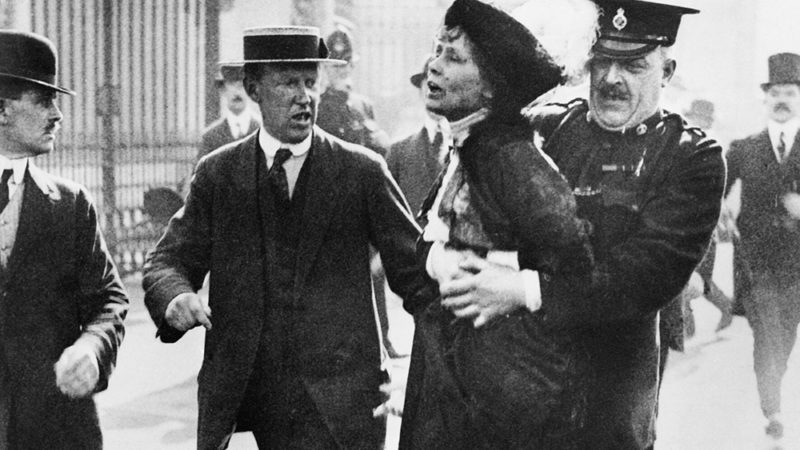The Suffragettes rightly broke the law with pride. An apology would only let the Tories off the hook.

It seems that absolutely every organisation is trying to come up with a policy to out-Suffragette each other today: some policy which will grab the headline and capture the mood.
And fair enough: this is a day to be honoured, respected – and a chance to reflect carefully about the state of Britain 100 years after (some) women won the right to vote.
Labour’s policy, announced by Jeremy Corbyn, is for the government apologise to Suffragettes and have their criminal records overturned. Home Secretary Amber Rudd is said to be considering what is, on the face of it, a lovely progressive idea.
Except for one thing: is it likely the Suffragettes would actually want that?
Think about it. If you had broken the law deliberately, to show that ‘the law is an ass’ – would you want to be excused for that?
Would you not want that to be on record? Would you want another government to say ‘sorry’?
Let’s remember – this apology would be granted by a Conservative government which has:
- Closed down women’s refuges
- Failed to act on the calls of the Women and Equalities Select Committee
- Slashed benefits (disproportionately harming single mothers)
- Rested its survival on a hard-right party which opposes abortion rights for women
- Implemented austerity policies – with women bearing 86% of the burden
- Closed the Discretionary Social Fund – which provided crisis loans to those escaping abuse
In 2004 there was a similar campaign for the Suffragettes to be pardoned.
It was rejected – including by many feminists.
In an article here, Fran Abrams ripped the arguments to shreds:
“To suggest that the criminal record of the suffragettes should be erased is to misunderstand the nature of their protest. Arrest and imprisonment were two of the key weapons at hand in a world where women had no political rights, and they used them to the full.
“Christabel set out for the Free Trade Hall that fateful evening with the words: “I shall sleep in prison tonight.” And she did. The next day the papers, which had remained tight-lipped on the subject of women’s suffrage during 40 years of peaceful, law-abiding campaigns, were full of it.
“When she spat in the face of Superintendent Watson, protesting the next day that she had been unable to slap him because her arms were pinned, Christabel was following a long tradition of honourable law-breaking. Her own mother, Emmeline, had been summoned several years earlier for defying a ban on public speaking at Manchester’s Boggart Hole Clough. Later she, too, went to prison for the vote.
“The suffragettes often suffered brutality at the hands of police and prison guards. But they did so with a glint in their eyes, mindful of the media potential of such outrages.”
Feminist activist Caroline Criado Perez makes a similar point:
Pardoning them now whitewashes their radicalism – and that is wrong. They *were* radical. They did break the law. They did so knowingly. They celebrated their war wounded with badges and pins and sashes.
— Caroline Criado Perez (@CCriadoPerez) February 6, 2018
A Conservative government pardoning the Suffragettes would be a convenient way to avoid taking real action – such as reversing the disturbing ‘two child limit’ they introduced without a Parliamentary vote.
Theresa May is under pressure to back this pardon. And while I happily defer to the feminist activists and campaigners on this one, there’s a real risk that if she did wipe the Suffragettes’ records clean, this would just give a green light for her government to carry on cutting services that women depend on the most.
Instead, the government could actually act. To listen to feminist campaigners and women’s groups calling for real policy change now. And to reverse their disastrous austerity policies – rather than offering a red herring while they continued hurting working class women.
Josiah Mortimer is Editor of Left Foot Forward. Follow him on Twitter.
Left Foot Forward doesn't have the backing of big business or billionaires. We rely on the kind and generous support of ordinary people like you.
You can support hard-hitting journalism that holds the right to account, provides a forum for debate among progressives, and covers the stories the rest of the media ignore. Donate today.




One Response to “Sorry Corbyn, but the Suffragettes should not be pardoned”
patrick newman
Did they go to prison because they were prevented from lawful protest and campaigning by the state? In this case, the state does need to apologise and pardon.